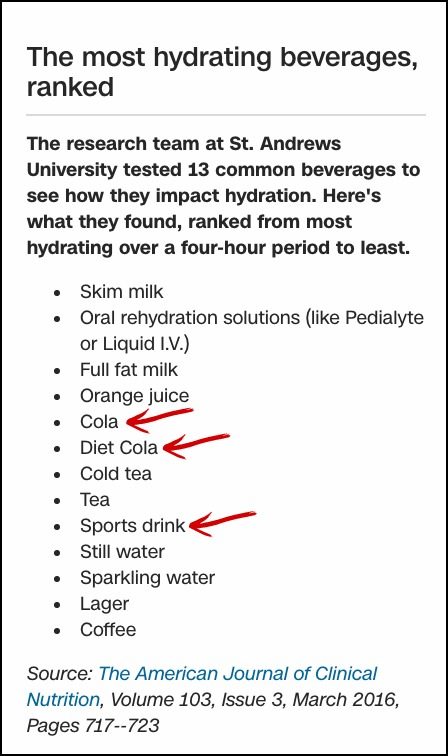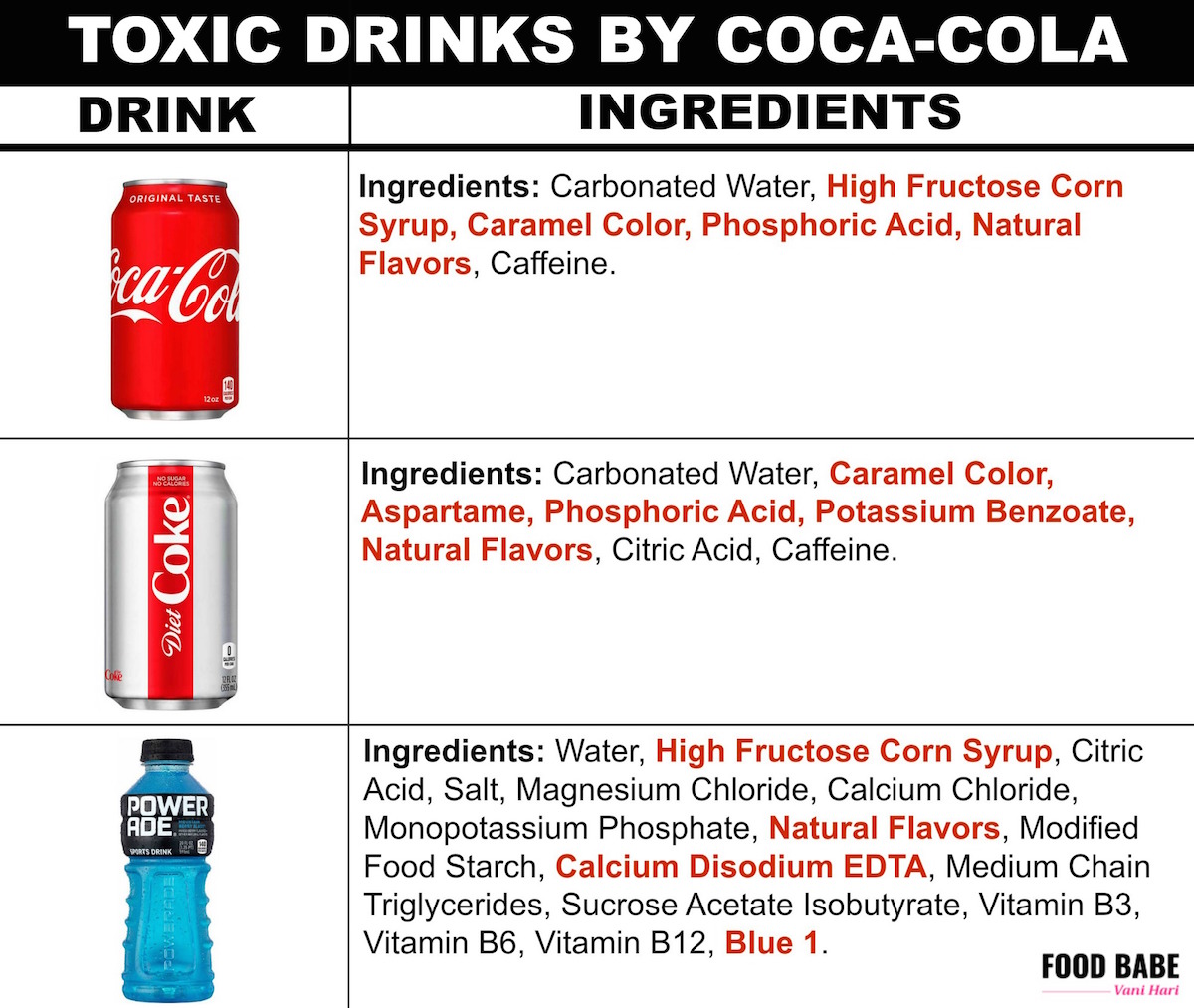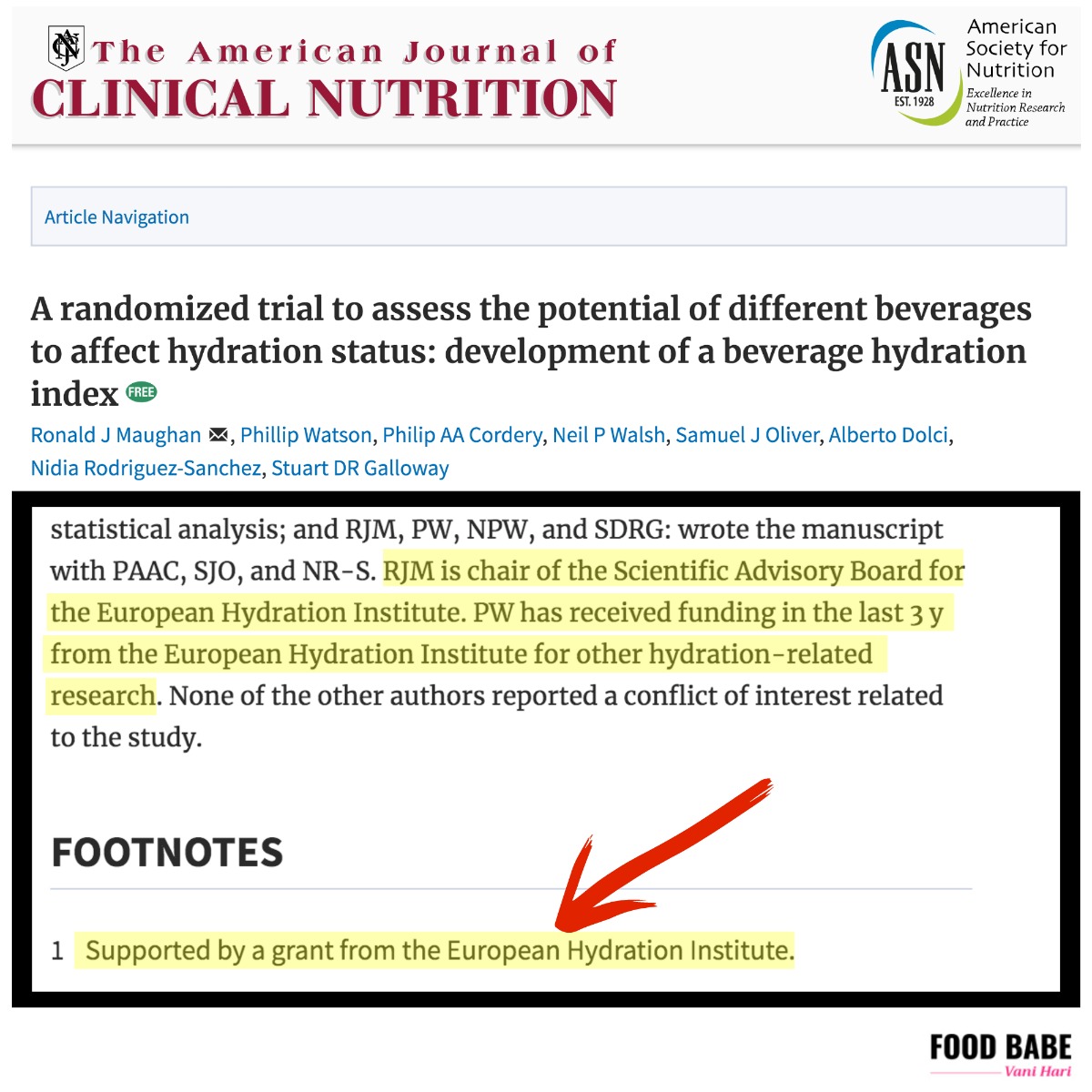What’s the best way to stay hydrated? (And other news you should never believe)
I was instantly suspicious when I saw this recent headline on a major news outlet: “Which drink is best for hydration? Hint: It isn’t water.” They reported the results of a study published in the American Journal of Clinical Nutrition which found that milk, soda, and sports drinks are all MORE hydrating than water. Water was ranked down as 10th on the list. (1)(2)

The first thing I did, was research who funded this study.
I always follow the money trail when reading something that goes against my common sense about food and promotes junk food or sodas as healthy options. As I wrote about in Feeding You Lies, a major way that the Big Food industry fools the public is with shady paid-for science, producing studies that are actually thinly veiled marketing ploys. They’re also really good at manipulating the media into reporting messages that support the processed food industry.
To suggest that sodas and sports drinks filled with high fructose syrup, artificial sweeteners, artificial colors, and caramel color linked to cancer are a good choice is outrageous. If anything, these toxic concoctions are destroying your health one sip at a time.

I just knew that the soda industry had to be behind such a study that would ridiculously promote that idea that guzzling down Coke and Powerade is a good way to stay hydrated.
And it turns out my suspicions were right…
I clicked on the study, scrolled down to the footnotes, and bam! — Right there it disclosed that the study was “Supported by a grant from the European Hydration Institute.”

The European Hydration Institute (EHI) is nothing more than a front group for Coca-Cola.
Coca-Cola spent £4.86 million setting up the EHI – a group that promotes the consumption of soda and sports drinks. Coca-Cola remains listed as a founding partner on EHI’s website. (3) EHI’s Director, Jane Holdsworth, worked in marketing for the dairy industry and founded her own marketing consulting firm. She counts Coca-Cola, Kellogg’s, Kraft, and Pepsico as previous clients. (3)
None other than Rhona Applebaum, former chief health and science officer for Coca-Cola, sits on the Board of Trustees for EHI. (3) Rhona famously retired Coke in 2015 after the New York Times and Associated Press exposed how Coke funded another front group (the Global Energy Balance Network) to fool people into believing sugary drinks don’t cause obesity. (4)
The lead researcher in the hydration study had worked hand in hand with the soda industry as well. Ron Maughan was an emeritus professor at Loughborough University, which received almost £1 million from Coca-Cola. (5) He is currently sits as chairman on the EHI’s scientific advisory board. (3)
You would think the major media outlets reporting on this study would have at least mentioned these ties between this study, the European Hydration Institute, and Coca-Cola… but they didn’t!
I know it’s frustrating when there is so much conflicting health information being fired at us from all directions. Here are some tips for how to separate the TRUTH from the FICTION in health news:
- Look to see who is funding the research. Even if it sounds like reputable scientific organization, research who they are, who funds their work, who sits on their board of directors, and what types of health claims they’ve made in the past.
- Check whether any researchers disclosed a conflict of interest. Most academic journals require researchers to disclose any conflicts of interest in published studies. This information typically appears at the end of the study, following the concluding section.
- Conflicts of interest aren’t always listed honestly however, even in prominent journals. Look up which boards the scientists serve on and who has paid them to be a consultant. You can often find this in their public Curriculum Vitae or online profile.
- The same goes for journalists in the media. If you find an article that seems suspect, they may be working in cahoots with Big Food or Big Ag. Research what types of articles they’ve written in the past and who they use as sources. Are these sources front groups?
- Determine whether all viewpoints, for and against an issue, are presented. If everything is squarely on one side of an issue, you can bet that you are not getting the whole story.
Yes it often takes quite a bit of time and effort to figure out the facts. However, when it comes to your health, it’s absolutely worth it to determine what’s real and what’s not. At the end of the day, it’s nobody else’s responsibility to tell you what’s true.
You alone are responsible for the news you consume. We must become our own health investigators.
If you know anyone who needs to hear this, please share this post with them. And don’t forget to check out my latest book, Feeding You Lies, to learn more about the lies we are being fed about our food!
Xo,
Vani

Posts may contain affiliate, sponsorship and/or partnership links for products Food Babe has approved and researched herself. If you purchase a product through an affiliate, sponsorship or partnership link, your cost will be the same (or at a discount if a special code is offered) and Food Babe will benefit from the purchase. Your support is crucial because it helps fund this blog and helps us continue to spread the word. Thank you.
from Food Babe https://ift.tt/2KiTGBx
Comments
Post a Comment